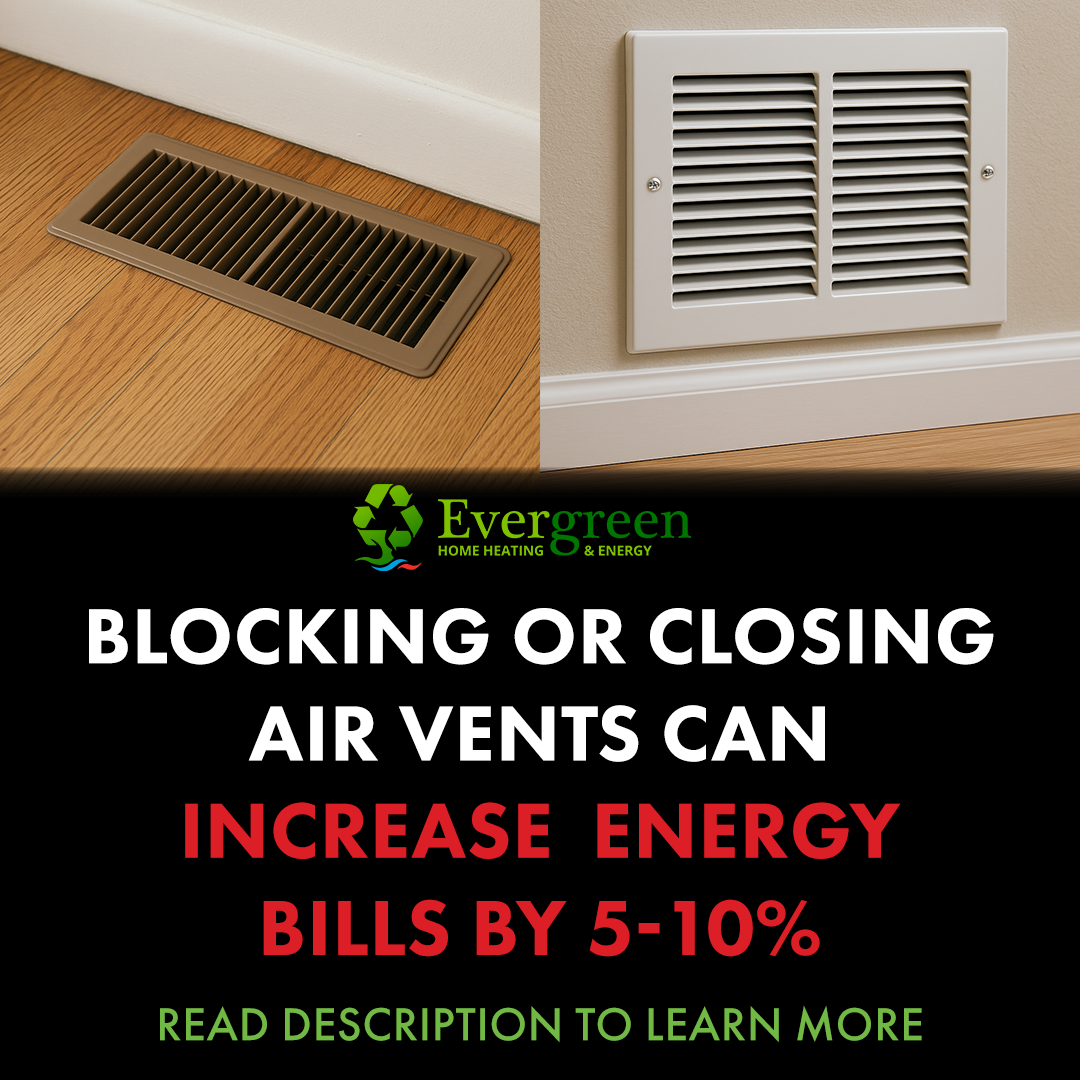Service Areas & Cities
Here Are The Areas We Serve In The King County Region
Types of Heat Pumps
July 03, 2012
While air source heat pumps are the most common type used in homes, heat pumps come in many types and configurations. I have outlined the most common types of heat pumps for you.
Central Heat Pumps vs. Ductless Heat Pumps
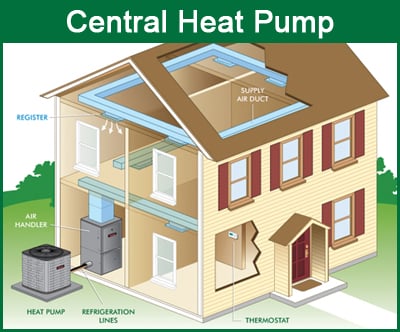 Central heat pumps provide central heating and cooling to homes and other buildings. A central heat pump works in conjunction with an
air handler or
furnace to circulate
conditioned air through a system of
ductwork. As long as the building's ductwork is properly designed, installed, and balanced, a central heat pump can efficiently provide balanced temperature and air flow throughout a building, resulting in cleaner indoor air and a very comfortable and healthy building.
Central heat pumps provide central heating and cooling to homes and other buildings. A central heat pump works in conjunction with an
air handler or
furnace to circulate
conditioned air through a system of
ductwork. As long as the building's ductwork is properly designed, installed, and balanced, a central heat pump can efficiently provide balanced temperature and air flow throughout a building, resulting in cleaner indoor air and a very comfortable and healthy building.
On the other hand, ductless heat pumps, as the name suggests, don't use any ducts. Rather than relying on a single air handler or furnace to circulate air, ductless heat pumps have one or several wall mounted air handler units. Ductless heat pumps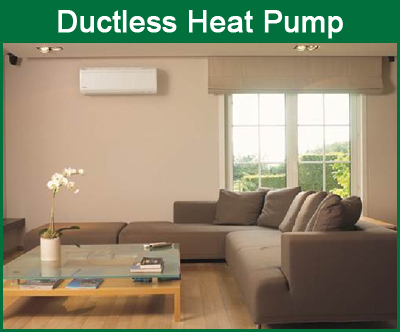 have several advantages over many other
central heating and cooling systems. The use of ducts to circulate air adds
static pressure to the system. In a nutshell, a duct system creates friction, making it more difficult for air to circulate. Because a ductless heat pump uses no ducts, it can move air more efficiently, making a ductless heat pump one of the most efficient heating and cooling systems available.
have several advantages over many other
central heating and cooling systems. The use of ducts to circulate air adds
static pressure to the system. In a nutshell, a duct system creates friction, making it more difficult for air to circulate. Because a ductless heat pump uses no ducts, it can move air more efficiently, making a ductless heat pump one of the most efficient heating and cooling systems available.
Another advantage of a ductless heat pump is that they can provide "zoning" if multiple indoor units are installed. This allows the temperature of different areas of a home to be independently controlled or turned off if unoccupied.
Ground Source (Geothermal) vs. Air Source Heat Pumps
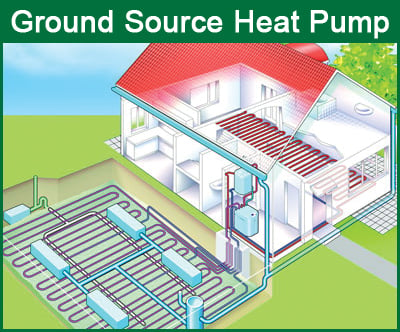 Ground source, or geothermal, heat pumps use the ground to generate heat in the winter, and remove heat in the summer. Temperatures in the ground are more moderate than temperatures in the air above ground. Ground source heat pumps use these moderate temperatures to their advantage, making them extremely efficient to operate. In fact, ground source heat pumps are the most efficient type of heat pump, able to reach up to 6
CoP even on the coldest winter nights. Air source heat pumps, on the other hand, can reach over 3 CoP on more mild days.
Ground source, or geothermal, heat pumps use the ground to generate heat in the winter, and remove heat in the summer. Temperatures in the ground are more moderate than temperatures in the air above ground. Ground source heat pumps use these moderate temperatures to their advantage, making them extremely efficient to operate. In fact, ground source heat pumps are the most efficient type of heat pump, able to reach up to 6
CoP even on the coldest winter nights. Air source heat pumps, on the other hand, can reach over 3 CoP on more mild days.
The biggest problem with ground source heat pumps is the initial cost. Because significant ground excavation and installation labor is required to install a ground source heat pump, the cost can be in the tens of thousands of dollars or more. Unfortunately, this highly efficient technology is cost prohibitive for most homeowners.
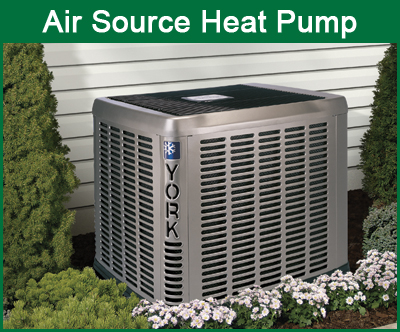 Air source heat pumps, on the other hand, move the heat in the air from the outdoors to the indoors in the winter, and cool the indoors during the summer. They are the most common type of heat pump. While they are slightly less energy efficient than ground source heat pumps, air source heat pumps can be installed for a small fraction of the cost of a typical geothermal system. Air source heat pumps are also highly efficient when compared with other types of heating systems. For homeowners looking to convert to a more energy efficient heating and cooling system and reap a significant cost savings over the life of their system, an air source heat pump is an excellent choice.
Air source heat pumps, on the other hand, move the heat in the air from the outdoors to the indoors in the winter, and cool the indoors during the summer. They are the most common type of heat pump. While they are slightly less energy efficient than ground source heat pumps, air source heat pumps can be installed for a small fraction of the cost of a typical geothermal system. Air source heat pumps are also highly efficient when compared with other types of heating systems. For homeowners looking to convert to a more energy efficient heating and cooling system and reap a significant cost savings over the life of their system, an air source heat pump is an excellent choice.
Dual-Fuel (Hybrid) Heat Pump Systems
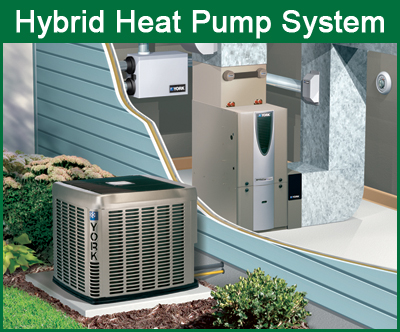 Hybrid heat pump systems combine an outdoor air source electric heat pump with an indoor gas furnace. This allows a homeowner to reap the benefits of the highly efficient heat pump during most times, and use the gas furnace as a backup heat source on the coldest days and nights of the year. Often times heat pump systems are installed with a backup source of heat in case of extremely low temperatures during the winter. This is due to the fact that as outdoor temperatures drop, the heating efficiency of heat pumps drops. The most common backup heat source in a standard heat pump system is an electric furnace, especially in homes without access to natural gas. The advantage of a hybrid system with a gas furnace is that on the days when backup heat is required, a gas furnace is typically less costly to run than an electric furnace.
Hybrid heat pump systems combine an outdoor air source electric heat pump with an indoor gas furnace. This allows a homeowner to reap the benefits of the highly efficient heat pump during most times, and use the gas furnace as a backup heat source on the coldest days and nights of the year. Often times heat pump systems are installed with a backup source of heat in case of extremely low temperatures during the winter. This is due to the fact that as outdoor temperatures drop, the heating efficiency of heat pumps drops. The most common backup heat source in a standard heat pump system is an electric furnace, especially in homes without access to natural gas. The advantage of a hybrid system with a gas furnace is that on the days when backup heat is required, a gas furnace is typically less costly to run than an electric furnace.
Central Heat Pumps vs. Ductless Heat Pumps
 Central heat pumps provide central heating and cooling to homes and other buildings. A central heat pump works in conjunction with an
air handler or
furnace to circulate
conditioned air through a system of
ductwork. As long as the building's ductwork is properly designed, installed, and balanced, a central heat pump can efficiently provide balanced temperature and air flow throughout a building, resulting in cleaner indoor air and a very comfortable and healthy building.
Central heat pumps provide central heating and cooling to homes and other buildings. A central heat pump works in conjunction with an
air handler or
furnace to circulate
conditioned air through a system of
ductwork. As long as the building's ductwork is properly designed, installed, and balanced, a central heat pump can efficiently provide balanced temperature and air flow throughout a building, resulting in cleaner indoor air and a very comfortable and healthy building.
On the other hand, ductless heat pumps, as the name suggests, don't use any ducts. Rather than relying on a single air handler or furnace to circulate air, ductless heat pumps have one or several wall mounted air handler units. Ductless heat pumps
 have several advantages over many other
central heating and cooling systems. The use of ducts to circulate air adds
static pressure to the system. In a nutshell, a duct system creates friction, making it more difficult for air to circulate. Because a ductless heat pump uses no ducts, it can move air more efficiently, making a ductless heat pump one of the most efficient heating and cooling systems available.
have several advantages over many other
central heating and cooling systems. The use of ducts to circulate air adds
static pressure to the system. In a nutshell, a duct system creates friction, making it more difficult for air to circulate. Because a ductless heat pump uses no ducts, it can move air more efficiently, making a ductless heat pump one of the most efficient heating and cooling systems available.
Another advantage of a ductless heat pump is that they can provide "zoning" if multiple indoor units are installed. This allows the temperature of different areas of a home to be independently controlled or turned off if unoccupied.
Ground Source (Geothermal) vs. Air Source Heat Pumps
 Ground source, or geothermal, heat pumps use the ground to generate heat in the winter, and remove heat in the summer. Temperatures in the ground are more moderate than temperatures in the air above ground. Ground source heat pumps use these moderate temperatures to their advantage, making them extremely efficient to operate. In fact, ground source heat pumps are the most efficient type of heat pump, able to reach up to 6
CoP even on the coldest winter nights. Air source heat pumps, on the other hand, can reach over 3 CoP on more mild days.
Ground source, or geothermal, heat pumps use the ground to generate heat in the winter, and remove heat in the summer. Temperatures in the ground are more moderate than temperatures in the air above ground. Ground source heat pumps use these moderate temperatures to their advantage, making them extremely efficient to operate. In fact, ground source heat pumps are the most efficient type of heat pump, able to reach up to 6
CoP even on the coldest winter nights. Air source heat pumps, on the other hand, can reach over 3 CoP on more mild days.
The biggest problem with ground source heat pumps is the initial cost. Because significant ground excavation and installation labor is required to install a ground source heat pump, the cost can be in the tens of thousands of dollars or more. Unfortunately, this highly efficient technology is cost prohibitive for most homeowners.
 Air source heat pumps, on the other hand, move the heat in the air from the outdoors to the indoors in the winter, and cool the indoors during the summer. They are the most common type of heat pump. While they are slightly less energy efficient than ground source heat pumps, air source heat pumps can be installed for a small fraction of the cost of a typical geothermal system. Air source heat pumps are also highly efficient when compared with other types of heating systems. For homeowners looking to convert to a more energy efficient heating and cooling system and reap a significant cost savings over the life of their system, an air source heat pump is an excellent choice.
Air source heat pumps, on the other hand, move the heat in the air from the outdoors to the indoors in the winter, and cool the indoors during the summer. They are the most common type of heat pump. While they are slightly less energy efficient than ground source heat pumps, air source heat pumps can be installed for a small fraction of the cost of a typical geothermal system. Air source heat pumps are also highly efficient when compared with other types of heating systems. For homeowners looking to convert to a more energy efficient heating and cooling system and reap a significant cost savings over the life of their system, an air source heat pump is an excellent choice.
Dual-Fuel (Hybrid) Heat Pump Systems
 Hybrid heat pump systems combine an outdoor air source electric heat pump with an indoor gas furnace. This allows a homeowner to reap the benefits of the highly efficient heat pump during most times, and use the gas furnace as a backup heat source on the coldest days and nights of the year. Often times heat pump systems are installed with a backup source of heat in case of extremely low temperatures during the winter. This is due to the fact that as outdoor temperatures drop, the heating efficiency of heat pumps drops. The most common backup heat source in a standard heat pump system is an electric furnace, especially in homes without access to natural gas. The advantage of a hybrid system with a gas furnace is that on the days when backup heat is required, a gas furnace is typically less costly to run than an electric furnace.
Hybrid heat pump systems combine an outdoor air source electric heat pump with an indoor gas furnace. This allows a homeowner to reap the benefits of the highly efficient heat pump during most times, and use the gas furnace as a backup heat source on the coldest days and nights of the year. Often times heat pump systems are installed with a backup source of heat in case of extremely low temperatures during the winter. This is due to the fact that as outdoor temperatures drop, the heating efficiency of heat pumps drops. The most common backup heat source in a standard heat pump system is an electric furnace, especially in homes without access to natural gas. The advantage of a hybrid system with a gas furnace is that on the days when backup heat is required, a gas furnace is typically less costly to run than an electric furnace.

